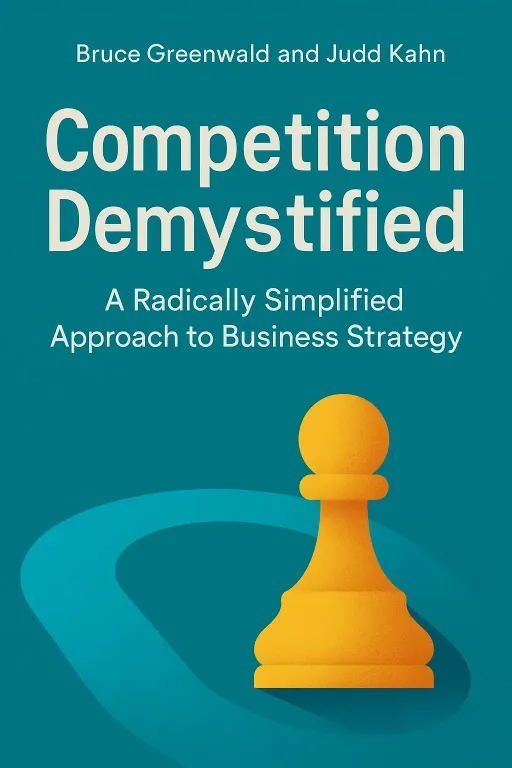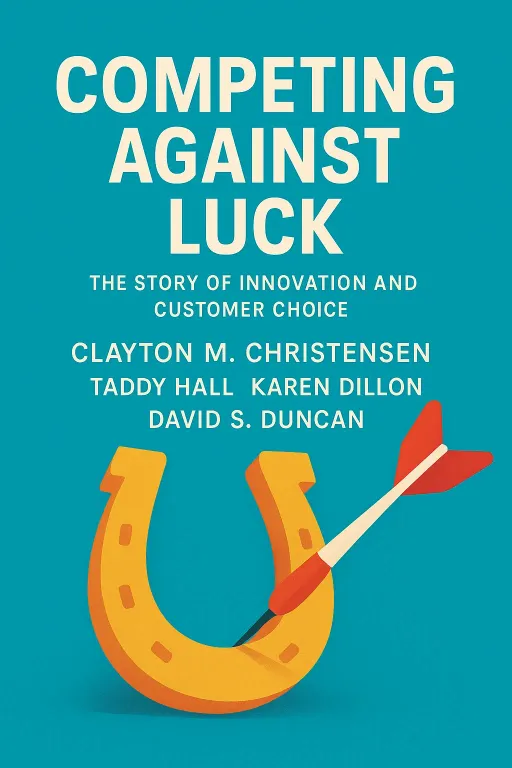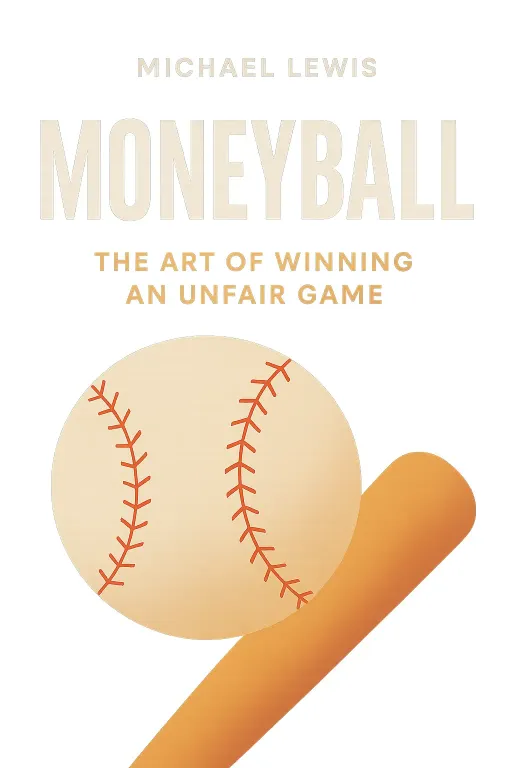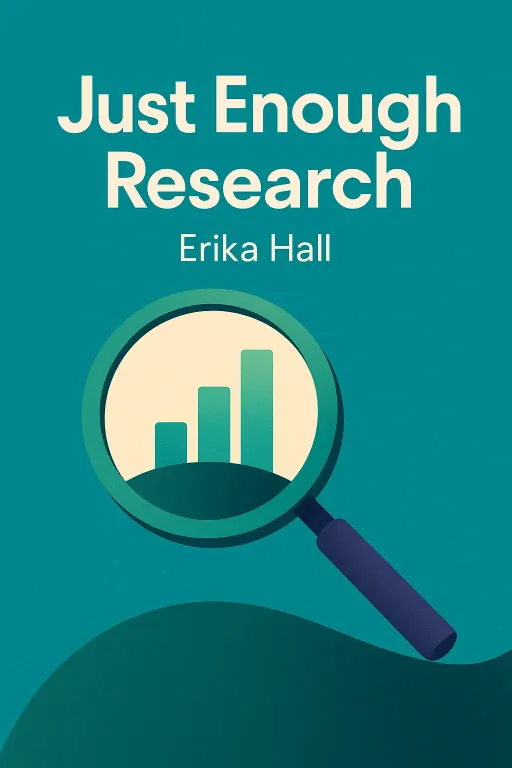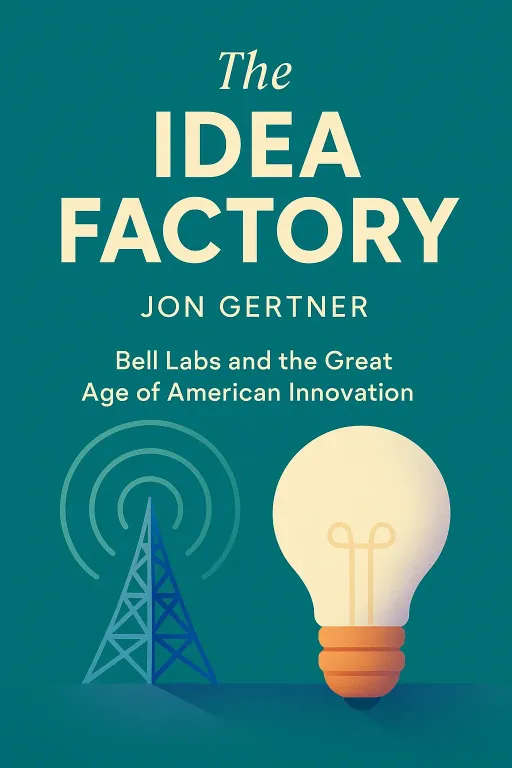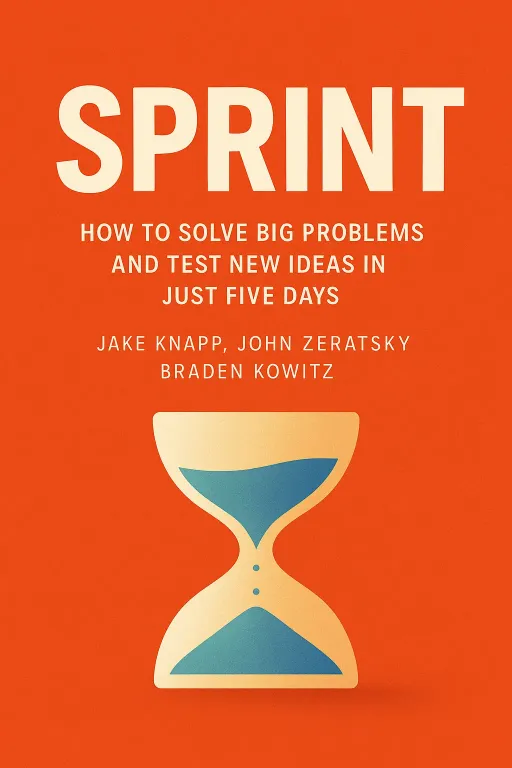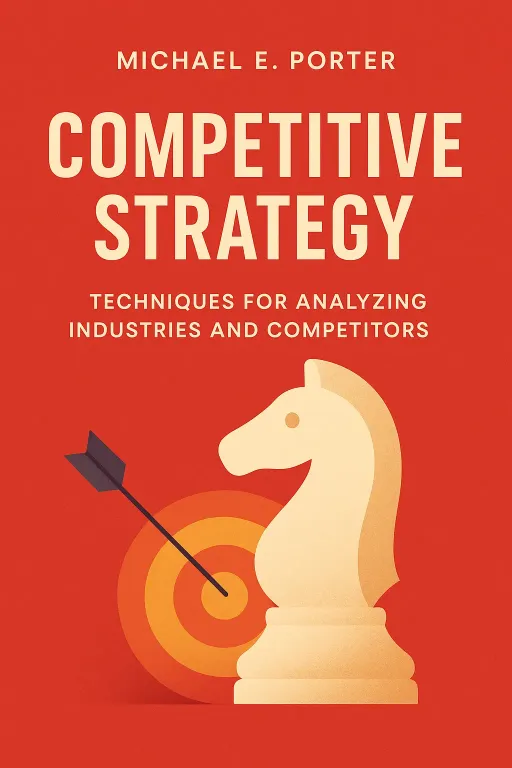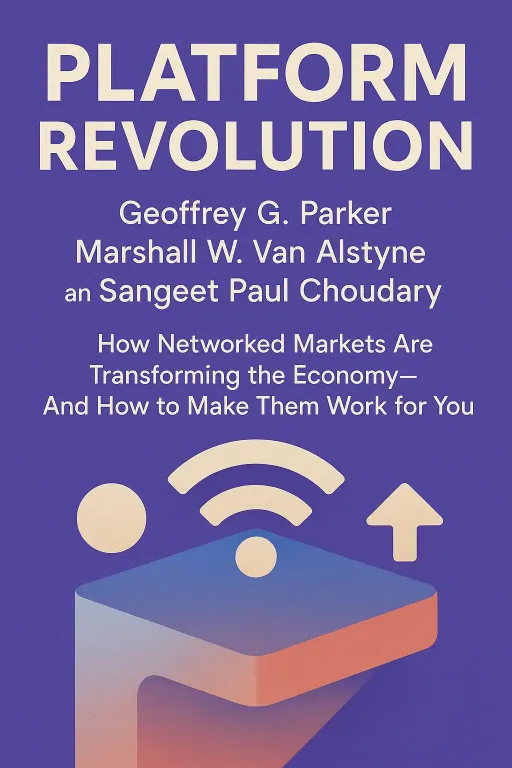
Build Connections, Not Things
14 minHow Networked Markets Are Transforming the Economy—and How to Make Them Work for You
Golden Hook & Introduction
SECTION
Joe: The most valuable business lesson of the 21st century is this: stop trying to build a better product. The world’s most dominant companies aren’t selling things anymore. They’re building connections. And that simple shift is why they’re winning, and everyone else is getting left behind. Lewis: Whoa, hold on. That sounds like one of those inspirational posters from a Silicon Valley startup that’s about to go bankrupt. "Stop building products"? What does that even mean? Every company sells a product or a service. Joe: That's the old way of thinking. And that's precisely the mental trap that this book we're diving into today helps us escape. It’s called Platform Revolution: How Networked Markets Are Transforming the Economy—And How to Make Them Work for You, written by Geoffrey Parker, Marshall Van Alstyne, and Sangeet Paul Choudary. Lewis: Right, and it's important to know, these aren't just business gurus. Two of these guys, Parker and Van Alstyne, are the actual academics who developed the economic theory of "two-sided markets" years ago. They were studying the blueprint for this economic earthquake long before most of us even had a smartphone. Joe: Exactly. They saw the tectonic plates of the economy shifting. This book was their way of handing the rest of us the "owner's manual" for a world that was being completely rewritten, a world where the most powerful companies don't own the very things that create their value. Lewis: That’s the part that always breaks my brain. It feels like a magic trick.
The Great Inversion: Why Platforms Are Eating the World
SECTION
Joe: It’s the perfect place to start. The first chapter of that owner’s manual would be titled 'Your Business is Now Inside Out.' Let's just state the central paradox that defines our modern economy. Uber, the world’s largest taxi company, owns no vehicles. Facebook, the world’s most popular media owner, creates no content. Alibaba, the most valuable retailer, has no inventory. And Airbnb, the world’s largest accommodation provider, owns no real estate. Lewis: Okay, every time I hear that, it sounds more absurd. So what do they own? What is the "thing" they're selling if it's not cars, content, or hotel rooms? Joe: They own the network. They own the connections. Think about a traditional business, what the authors call a "pipeline." General Motors is a perfect example. They buy raw materials at one end, run them through a long, complex internal process—design, manufacturing, assembly—and push a finished car out the other end. The value is created inside the pipeline. Lewis: Makes sense. They control every step. Joe: A platform does the opposite. It builds a foundation—a digital infrastructure, like an app and a set of rules—and then gets out of the way. The value is created outside the company, by the interactions between external producers and consumers. Uber doesn't hire drivers or tell them where to go. It connects someone who needs a ride with someone who has a car and some free time. Airbnb connects someone with a spare room to someone who needs a place to stay. The firm is inverted. Its focus shifts from internal activities to managing this external ecosystem. Lewis: So a traditional company is a restaurant that meticulously plans a menu, hires chefs, buys ingredients, and serves you a meal. A platform is the person who built the world's best farmers' market. They don't grow a single carrot, but they've created a bustling space where farmers can easily sell to hungry customers. Joe: That is a perfect analogy. And the platform's job is to make sure the market is safe, clean, and easy to navigate. They provide the stalls, the payment systems, the reputation scores—the star ratings—so you know which farmer has the best tomatoes. They don't touch the tomatoes themselves. The value is in the exchange they facilitate. Lewis: But they do have something. They have the app, the code. Isn't that the product? Joe: The app is just the modern equivalent of the physical marketplace or the factory floor. It's the tool, but it's not where the core value is created. The value comes from the millions of users who choose to participate. Without the drivers, the hosts, the content creators, the app is just a ghost town. A useless piece of code. That's the inversion. The value is no longer in what the company owns, but in the community it cultivates. Lewis: Huh. It's a shift from owning assets to owning the ecosystem. It feels lighter, faster. Joe: Infinitely faster. A hotel chain like Hilton wants to expand? They need years and billions of dollars to buy land, get permits, and build a new hotel. How long does it take Airbnb to add a new "room"? About ten minutes, for a user to upload some photos and a description. The marginal cost of adding supply is virtually zero. That's why these platforms can scale at a speed that traditional businesses find terrifying.
The Magic Flywheel: Demystifying Network Effects
SECTION
Lewis: Okay, I get the model. It's asset-light, it's scalable. But that still doesn't fully explain the gravity-defying, multi-billion dollar valuations. A great farmers' market is nice, but it doesn't justify that kind of money. It feels like there's a secret ingredient I'm missing. Joe: You've just set up the single most important concept in the book: network effects. And this isn't just theory; it was the heart of a famous public battle of ideas. In 2014, Uber was valued at a mind-boggling $17 billion. A finance professor at NYU, Aswath Damodaran—a brilliant, no-nonsense valuation expert, the voice of Wall Street reason—published an analysis. He looked at the total size of the global taxi and car service market and said, even with optimistic assumptions, Uber is worth, at most, about $6 billion. Lewis: That sounds logical. You can't be worth more than the entire market you're serving. Joe: That's the pipeline way of thinking. Then, a venture capitalist and Uber board member, Bill Gurley—the voice of the Silicon Valley future—wrote a blistering response. He said Damodaran's analysis was fundamentally flawed because he missed the magic ingredient: network effects. Lewis: This sounds like a buzzword VCs use to justify throwing money at things. What does it actually mean in practice? Joe: Gurley laid it out with a simple, beautiful diagram. It’s a virtuous cycle, a flywheel. It starts with one side of the platform—say, drivers. The more drivers Uber has in a city, the shorter the wait times for a ride. Shorter wait times create a better experience, which attracts more riders. More riders create more demand and more money to be made, which in turn attracts even more drivers. Lewis: Ah, so it's like a party. No one wants to go to an empty party. But the more people who show up, the more fun it is, which makes even more people want to come. The value of the party increases for everyone as it gets bigger. Joe: Exactly! And that's a positive, cross-side network effect. One side (drivers) makes the platform better for the other side (riders), and vice versa. This flywheel starts to spin, and it spins faster and faster on its own. What Gurley argued, and what Damodaran later conceded he'd underestimated, was that this effect doesn't just help you capture the existing taxi market. It expands it. Lewis: How so? Joe: People who would never have taken a taxi—because it was too expensive or inconvenient—started using Uber. They'd take it to a friend's house, or to a bar, or to run an errand. The market wasn't just "people who take taxis." The market became "anyone who needs to get from point A to point B." The network effect made the service so good and so cheap that it created entirely new demand. Damodaran was measuring the size of the pond, but Gurley was arguing that Uber was a machine that could make it rain and triple the size of the pond itself. Lewis: And the data backed him up. The book notes that Uber's market in San Francisco had grown threefold since its launch. That's not just taking market share; that's creating a new market. Joe: Precisely. But this magic also has a dark side, which the book is good at pointing out. Network effects can be negative. The classic example is Chatroulette, the platform that randomly connected you with strangers on webcam. Lewis: Oh boy, I remember that. The "Naked Hairy Men problem," as it became known. Joe: The very same. As the platform grew without any rules or curation, the quality of interactions plummeted. The more users it got, the higher the probability you'd be connected with someone you did not want to see. Legitimate users fled, which made the ratio of bad users to good users even worse. That's a negative network effect. The bigger it got, the worse it became. It shows that just having a network isn't enough. You have to manage it.
The Founder's Gauntlet: Launching and Governing a Platform
SECTION
Lewis: This all sounds fantastic if you're already Google or Facebook, with a billion users on your flywheel. But how does a new platform even start? It's the ultimate chicken-or-egg problem. No drivers, no riders. No sellers, no buyers. No one wants to show up to an empty farmers' market. How do you get the first carrot on the table? Joe: It's the single biggest hurdle. And the book highlights one of the most legendary and audacious solutions in tech history: the launch of PayPal. In the late 90s, they had this great technology for email payments, but no one was using it. They were stuck. Lewis: The empty party problem. Joe: Exactly. So they found a place where a party was already happening: eBay. It was a huge marketplace full of buyers and sellers who were still clumsily mailing checks and money orders to each other. PayPal saw this massive, unmet need for frictionless payments. That's the first strategy: the "piggyback" strategy. Find an existing platform and build on top of it. Lewis: Smart. So they just offered their service to eBay users? Joe: They did more than that. They created a bot that would buy cheap items on eBay and then, as the buyer, insist on paying the seller with PayPal. They were manually creating their own transactions to introduce the product to sellers. But the real genius was even more direct. They decided to just give people money. Lewis: You're kidding. Joe: Not at all. They launched a referral program. If you signed up for PayPal, you got $10. If you referred a friend who signed up, you got another $10. And your friend got $10. In the early days, they were spending a fortune. Their growth was explosive, but their cash burn was terrifying. Lewis: That sounds completely insane and unsustainable. They were just lighting money on fire! Joe: They were lighting money on fire to buy the most valuable asset in the world: a network. They understood that once they reached a critical mass of users, the network effects would kick in and the flywheel would start spinning on its own. The value of that network would be worth far more than the initial cost to acquire it. And they were right. eBay ended up buying them for $1.4 billion because PayPal had become the default payment system for their own platform. They solved the chicken-or-egg problem by literally paying the chickens and the eggs to show up. Lewis: That's a wild story. It shows the desperation and brilliance you need to get started. But what happens after you succeed? Once the market is thriving, how do you manage it? You mentioned the dark side of network effects. It seems like the "mayor" of the platform has a lot of responsibility. Joe: And a lot of temptation to abuse their power. Which brings us to the perfect cautionary tale of governance: Keurig. Lewis: The coffee pod people? I have one of those. What did they do wrong? Joe: For years, Keurig had a great platform. They sold the brewers—the "platform"—and licensed the K-Cup pod technology to hundreds of coffee brands—the "producers." Everyone was happy. But in 2012, their key patents expired. Suddenly, anyone could make a K-Cup compatible pod, often for cheaper. Lewis: So they faced competition. That's normal. Joe: Their response was the problem. They launched the Keurig 2.0 brewer. And this new machine had a scanner that would only accept pods with a special, proprietary ink on the lid. It was a technological lockdown. They were trying to use their control over the platform—the brewer—to kill competition in the producer ecosystem—the pods. Lewis: But isn't that just smart business? Protecting your turf? Every company wants a monopoly, right? Joe: In a pipeline world, maybe. But in a platform world, it's suicide. The book lays out the fundamental rules of good governance, and Keurig broke all of them. A platform must create value for its entire ecosystem, not just extract value for itself. By locking out other pod makers, they weren't making the coffee experience better for consumers; they were making it worse by reducing choice and raising prices. Lewis: You're not a king, you're a mayor. And if you make the city a terrible place to live by taxing everyone into oblivion and closing all the shops, your citizens will leave. Joe: That's it! And they did. Customers were furious. There were viral videos teaching people how to hack the Keurig 2.0 to use their old pods. Sales plummeted. The brand was severely damaged. They forgot the cardinal rule: the platform's success depends on the success of its participants. If you start treating your producers and consumers as resources to be squeezed, they will find another market.
Synthesis & Takeaways
SECTION
Lewis: So when you boil it all down, this isn't just a new business model. It feels like a fundamental shift in the philosophy of value. It's about moving from a mindset of control to one of orchestration. Joe: That's the perfect word. Orchestration. The old titans of industry, the Henry Fords and the like, were conductors of an orchestra they hired, owned, and completely controlled. The new titans, the Bezoses and Zuckerbergs, build a stage and invite the world's best musicians to come and play. They provide the acoustics, the lighting, the ticketing—but they don't play the instruments. Lewis: And the book makes it clear that this has created immense value and convenience. I can get a ride, a place to stay, or virtually any product delivered to my door with a few taps on a screen. But it also feels like there's a tension there, a risk. Joe: That's the final, crucial point the authors grapple with. The real challenge, and the book's underlying warning, is ensuring that the stage owner doesn't end up taking all the ticket revenue, leaving the musicians with nothing. We see this debate playing out right now with app store fees, driver compensation, and content creator revenue. Lewis: It makes you look at every app on your phone differently. When you use it, are you the customer, or are you the product being sold? Or, in the platform world, are you actually both? You're the consumer of the service, but your participation is the very thing that makes the service valuable. Joe: You are the value. And that's a huge question for the next decade of our economy. We'd love to hear what you think. What platforms do you use every day, and how do you see this dynamic playing out? Are they creating value for you, or just for themselves? Let us know. Lewis: This is Aibrary, signing off.
